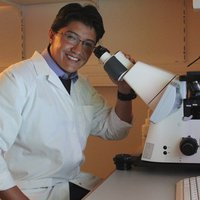In 2010, something extraordinary happened: a scientific news story filled the headlines of many international media sources. The scientist Craig Venter had announced the development of the first synthetic genome. For the first time, there was a chain of genetic information that did not belong to a living being but rather was manmade. Since then, the technique has evolved, and is now being considered as a tool for storing information and developing new drugs. But, although the potential of synthetic DNA is seemingly unlimited, creating it using chemical catalysts known as nucleoside phosphoramidites is a slow and inefficient process which has experienced a limited amount of innovation since it emerged more than 40 years ago.
Acutely aware of this after facing the challenges posed by the technology, the molecular biologist Sylvain Gariel decided to find a new approach. In 2013, Gariel set out with his colleague Thomas Ybert to accomplish their dream of creating a new way of synthesizing DNA capable of turning the engineering of the genome into a process as simple as programming software. Four years later, his efforts have led to his recognition as one of MIT Technology Review, Spanish edition's 35 Innovators Under 35 Europe 2017. "We are trying to create and print synthetic DNA using naturally occurring enzymes to replace chemical catalysts," the young innovator explains.
It is difficult to create long strands of DNA using the traditional technique involving nucleoside phosphoramidites, so scientists must produce shorter fragments and then string them together to form longer strands. But the purity of each fragment is only between 98% and 99.5%, which forces researchers to perform cleaning processes. The overall process is extremely limiting in terms of performance, speed, cost and final quality. To overcome these obstacles, Gariel has developed a synthetic enzymatic DNA technology, and is now working on a DNA printer which allows for the automatic production of these fragments. The entrepreneur outlines: "The novelty that we afford can be summarized as accelerating and simplifying the process of DNA and RNA synthesis and improving the quality of the final product."
Gariel is executing this project through the start-up which he founded in 2014 DNA Script. With its line of printers, DNA Script will allow users to synthesize a variety of DNA and RNA products, from isolated genes or plasmids to entire chromosomes, in record time. This company boasts a solid, multinational team of 12 scientists experienced in enzymatic biochemistry, nucleic acid chemistry, biotechnology and automatization.
DNA Script´s business model consists of selling ADN printing systems to R&D teams at academic and governmental institutions and private companies in various sectors. Revenue will be generated through the sale of instruments and the recurring sales of reagents and disposables.
"The project is truly impressive and the solution defined is very innovative," according to the research director at the City of Paris Industrial Physics and Chemistry Higher Educational Institution (France) and Innovators Under 35 Europe 2017 jury member,
Karim Benchenane. In his view, DNA Script's project could prove extremely important for the advancement of molecular biology in general and the acceleration of DNA and RNA synthesis in particular.
By Natalia Cascón
Translation: Teresa Woods




